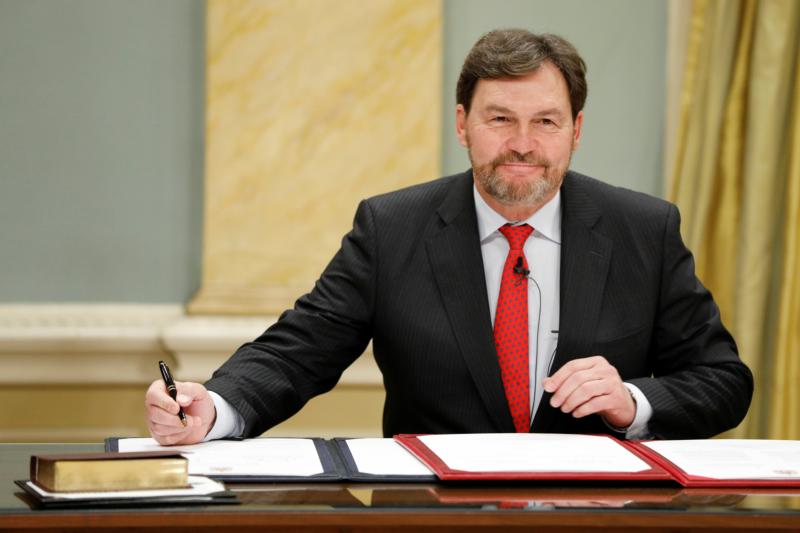
Chief Justice Richard Wagner is seen at Rideau Hall in Ottawa, Ontario, Dec.18. (CNS photo/Blair Gable, Reuters)
OTTAWA, Ontario (CNS) — The Supreme Court has opened the door for discrimination based on a person’s religious beliefs and moral values, Canadian bishops wrote in a frank rebuttal to a decision by Canada’s highest court.
In the wake of a June 15 ruling that will likely scuttle a proposed law school at Trinity Western University, the bishops issued a statement that said they were ” deeply concerned” and warned of “serious implications” and “negative repercussions” for individuals and institutions.
The statement comes after the court, in a 7-2 decision, upheld the right of law societies in British Columbia and Ontario to reject graduates of TWU’s proposed law school. The law societies objected to the Evangelical Christian university’s community covenant, which includes a requirement that staff, students and faculty abstain from sexual activity outside traditional marriage. The court deemed the covenant harmful to the equality and identity of non-heterosexual students.
[hotblock]
“The decision by the court effectively means that provincial law societies can discriminate against lawyers on the basis of their religious affiliation and moral values,” the Canadian Conference of Catholic Bishops said in a June 20 statement. “Furthermore, any organization is now at risk for its views on equality, diversity and inclusion if it depends on a regulatory body with a mandate to act in the ‘public interest.'”
The CCCB warned that the court’s interpretation of the public-interest mandate asserted by law societies “has serious implications for all private faith-based educational institutions and could have negative repercussions for religious charities and other organizations.” The CCCB pointed out that Catholic beliefs are similar to those expressed in TWU’s covenant.
The CCCB, an intervener in the case, had argued before the court about the risk of establishing “a hierarchy of rights” in which “the equality rights of the LGBTQ community, considered in the abstract, will trump the right to religious freedom and so undermine all … protections” in the Canadian Charter of Rights and Freedoms.
At a news conference June 22, Chief Justice Richard Wagner was asked if the court viewed conscience rights and religious identity as less important than the identity of LGBT people.
“That’s one interpretation and I respect it,” he replied.
Wagner said context is crucial to interpreting the constitution and the Charter.
[tower]
“The court believes, and I firmly believe, the constitution is like a tree that keeps on growing,” Wagner said. “We have to interpret it against the backdrop of a society that evolves. New technologies are taking us into new areas; what we need to do is take the constitution and interpret it against the backdrop of a society that has evolved.”
Wagner noted that in the 2015 Carter decision, which legalized euthanasia, the court reversed a decision from many years before, even though it was faced with the same facts and the same section of the Criminal Code.
“Society has evolved, as has medicine,” he said. “There are moral values that link the majority of Canadians.” He pointed out “attitudes can change very quickly; environments can change very quickly.”
Douglas Farrow, professor of theology and Christian Thought at McGill University, expressed concern that what Wagner calls “evolving moral values” will become “for the rest of us devolving, indeed disappearing, rights.”
“This is not the rule of law but rather the ruin of law,” he said.
Constitutional lawyer and law professor Iain Benson, who now teaches in Australia, wrote on Facebook that the decision suggests, “law is in free-fall.”
“You will see things now unwind. How quickly is hard to say, but the illiberal direction is clear,” he wrote.
REAL Women of Canada also released a blistering assessment of the decision.
“The Supreme Court of Canada in its current decision, threw all circumspection and objectivity aside, and concluded in a 7-2 decision that tolerance of LGBTQ was required by TWU, but the LGBTQ community did not have to tolerate Christians’ constitutional rights, which could be overridden.
“In short, there was no balancing of religious rights.”
***
Gyapong is Ottawa correspondent for Canadian Catholic News.
PREVIOUS: New cardinals see red hats as call to more service
NEXT: Spanish church warns on exhumation of dictator


Share this story